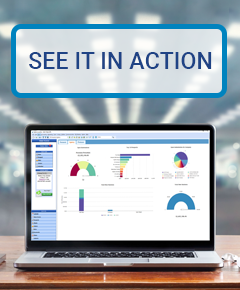
Marketing, Sales, Technology Trends
Insurance prospecting can be intimidating, even for the most seasoned professionals in the industry. Finding prospects can seem a daunting task, much less making the sale and moving them to customer. But, with the right tools and perseverance, insurance prospecting is not as impossible as it seems.
Tool #1: Customer Relationship Management (CRM)
You’ve heard CRM thrown around a lot – but what exactly is it? A CRM is a tool that allows you to track leads, prospects, and current customers, reviewing and adding information to see where they are in your sales cycle. Think of it as the modern day little black notebook full of relevant data to help you nurture leads, keep track of customer needs, and stay organized in your sales process.
CRMs are essential information hubs. They store contact information, meeting details, follow-up attempts, and even website visits and interactions for each constituent. All that data in one place gives you an accurate picture of where you stand not only with each customer or prospect but overall as an agency.
Tool #2: Integrated Communication Tools
What you say and how often you interact with prospects and customers is a critical piece of the sales cycle, yet it’s almost impossible to remember to note each interaction. That’s where integrated texting and email come into play. These synched up communication tools make it easy to feed your customer and prospect interactions right into your CRM, so you never miss an entry.
Find out more about Partner Platform’s email integration and integrated texting offerings
Tool #3: Social Media Scheduler
Regular action on social media is now a required part of your insurance prospecting. Customers and prospects alike will look to your social presence to get a feel for your agency and to see what others think of you. You need to post regularly to steer the conversation. Frequent posting also shows you’re active and engaged and brings you top of mind to those searching for a provider.
A social media scheduler can help you keep up with regular posts by allowing you to simultaneously post to multiple platforms at once. And, true to its name, a social scheduler lets you plan ahead and schedule posts for weeks and months in the future. That means you won’t need to take time every day to remember to post but can dedicate a time to schedule ahead and avoid the interruptions.
Tool #4: Marketing Automation
Marketing automation brings social and other communication scheduling together in one system. With its email features, you can schedule regular e-newsletters, birthday and holiday greetings, and renewal reminders to customers. You can also set up customized prospect outreach messaging to send at different intervals, including an automated first message sent to those requesting a quote or filling out other forms.
For social media, marketing automation tools can schedule messaging and track data like shares, likes, and comments. Plus, messaging can be tailored by audience and synched up with your email communications for an all-in-one outreach messaging and tracking hub.
See how Partner Platform’s Marketing Automation Manager can help your agency improve prospect outreach and customer retention
Tool #5: An Integrated Insurance Management Platform Experience
While each of the insurance prospecting tools above can boost your sales, together they can exponentially improve your outreach and client retention. That’s why we created an all-in-one integrated prospecting experience with our Partner Platform.
The cloud-based comprehensive system includes our Marketing Automation Manager, which creates customizable, automated workflows and mass campaigns for client and prospect communication, and our Producer Results Manager for a complete customer relationship management solution to convert prospects into lasting clients. That’s a winning combination you can’t beat, and just part of what the Partner Platform has to offer your agency. See more Partner Platform capabilities and view a demo to see how the Partner Platform can change the direction of your agency.

Agency Operations, Technology Trends
We’re living in a digital world. It’s estimated that by 2040, 95 percent of purchases will be via online methods. And with good reason – digital purchasing is faster, more efficient, and less expensive for both merchant and buyer. But there is still a part of digital business that looms: cyber-attacks on your insurance agency systems.
It’s reported that by 2018 nearly 70 percent of businesses experienced a cyber-attack. Even scarier, a Nationwide survey showed only 9 percent of companies said they were victims of an attack when in fact, after seeing a list of harmful activity, at least 50 percent had experienced one. Chances are those businesses didn’t know how to prevent an attack, either.
Get more detailed info on protecting your agency in our Cyber Security and Data Protection eGuide
Knowing the Threats
The first step to protecting your agency and its data is knowing what threats are out there. The most common threats are:
- Viruses infecting systems and destroying data
- Hackers breaking into systems and stealing personal data
- Employees leaving systems open for passersby to see and steal info
Unfortunately, the last threat is more common than you may think. IBM and Ponemon’s Institute’s Cost of a Data Breach Study showed 27 percent of data attacks were due to human error while 25 percent were a system glitch. That’s over half of cyber weaknesses falling squarely in the laps of the victims.
Read more on how to keep your agency safe from cybersecurity experts in the industry
Implementing Insurance Agency System Solutions
The good news is you have control over these vulnerabilities. You can decrease your likelihood of attack through a few simple agency system solutions:
- Limit access to sensitive data
- Require multi-character encrypted passwords that change regularly to access data
- Conduct background checks on employees who access sensitive information
- Educate employees on best practices, such as only accessing data on private networks
- House data on a secure, off-site server with redundant back-up and outsourced security monitoring
- Regularly test your security systems, including drills for employees
- Purchase liability insurance for your agency in case of unpreventable threats
Read the Top 4 Reasons to House Your Insurance Data Offsite on our blog
Finding a Partner You Can Trust
At SIS, we always have security top of mind. Every Partner Platform upgrade is coupled with security testing, ensuring we’re handing our Partner agencies a safe, secure, effective tool. And we leverage state-of-the-art technology to hold customer data in facilities with geographic redundancy, data encryption, and backups compliant with industry and government standards.
We work hard to earn and keep our Partner agencies’ trust. See what they have to say about our security and service: check out our Client Stories page to find out more.

Agency Management System Best Practices, Agency Operations, Technology Trends
Close to 90% of people say they always have their smartphone close. That’s 90% of people who can read and respond to anything sent to their phone almost immediately. With that sort of accessibility, integrated texting is a critical insurance management system tool. Texting is a great way to get short, important messaging to your agency’s prospects and clients, providing the convenient communication they desire.
Texting and Your Agency: Efficiency and Safety
Texting is not only fast, it’s also effective: texting open rates are around 98% while email is still hovering around less than 25%. With texting, you can schedule messaging knowing the recipient will almost certainly read it.
Dive deeper into texting and your agency with our post on texting best practices
Beyond its speed and efficiency, texting can also be a great addition to your E&O toolbelt. Integrated texting allows you to capture everything you sent in your agency management system, attaching it to client and prospect profiles as needed. This allows you to have a permanent record of your conversation instantly.
And, texting is a lifesaver when it comes to claims management. Texting allows clients to take photos and send information the moment an accident happens, making the information that much more reliable. In many cases, texting is even better than opening an app as it requires no sign-in and it’s a process the client knows well.
Get best practices on all agency communications on the SIS blog
Texting and the Partner Platform
At SIS, we’ve worked with our customers to provide all the efficiencies they need while remaining E&O complaint. That’s why we added integrated texting to the Partner Platform.
Texting is integrated directly so our Partner agencies can send messages right through the system and replies will be captured and paired with prospect and client profiles. And, it’s easy for clients to opt-out per texting regulations. It’s just another way Partner Platform helps your agency get more done, better.
Learn more about our integrated texting, and other Partner Platform features: contact us today to view a demo and see how Partner Platform can transform your agency.

Marketing
We’re on to part three of our look at insurance agency marketing to the generations with an analysis of the oft-stereotyped Baby Boomers. Born between the mid-1940s and mid-1960s, Boomers number an estimated 75.4 million in the U.S. Many are looking forward to retirement and have big plans for an active future.
Those big plans mean Boomers are prime consumers. Baby Boomers’ spending is estimated to increase by 58 percent over the next 20 years, while Millennials and Gen X will only increase spending by 24 percent. And, they’re doing more of their shopping online, spending more on average per transaction than Millennials.
These facts point to the same conclusion: Boomers are a powerful buying force. How do you harness that force for your agency?
Read Part One in our series: insurance marketing to the rising Generation Z
Get Personal
A recent study showed over 65 percent of Baby Boomers went for one-on-one meetings when seeking insurance. Boomer’s preference for personal interaction doesn’t stop there: the same study showed Boomers preferred any “live communication” during the purchasing process. Live communication includes over the phone and online chat – any method that gets them in touch with a real person in real-time.
Treat Them Well
It’s critical to provide great service to all customers regardless of age, but it’s especially important to Baby Boomers. They are the most likely to write off a company due to bad service. And, they’re loyal to good service. One study showed 54 percent were “very or somewhat likely” to stick with a business if their patronage was valued. Only 33 percent of Millennials agreed.
Take a look at Part Two on our series, focused on marketing to Generation X
Be Mobile Ready
Half of those 60 to 69 and almost 75 percent of people in the 50 to 59 age range own a smartphone. Yet, Boomers still face a persistent stereotype that they’re not tech savvy. Don’t be fooled. Boomers also own 1/3rd of all tablets purchased in the U.S. Suffice to say Boomers expect websites to be mobile accessible.
Get Social
Social media continues to rise in popularity for Baby Boomers, with 82 percent belonging to at least one social platform. Though LinkedIn, Pinterest, and Twitter are all in play, Facebook is by far the most used social platform by Boomers, coming in twice as popular as the rest. And, Boomers like to share what they find on social – they’re 19 percent more likely to do so than other generations.
Find out how to get your agency to Boomer’s scrolls in our post on Getting Your Website Seen and Heard
Use Your Words
Contrary to most marketing trends, Baby Boomers are reading what you write. They’re more likely to look at print and read whole articles than Millennials or Generation Z, so give them something to take in. When it comes to writing, Boomers look for straight talk and facts. They’ve been marketed to for years, growing up during the advertising boom, and are almost immune to gimmicky and salesy language. Be clear and honest, and avoid spelling and grammar mistakes as many Boomers take note of these small errors.
Avoid the Age Gap
Don’t call Boomers “old.” Just don’t.
Marketing to the Generations
If you’ve read the other posts in our series, you’ll know each generation is different and responds better to sometimes contrasting marketing methods. Such duplicity means you need varied marketing tactics, segmented to target each group individually.
The Partner Platform Marketing Automation Manager (MAM) is designed to tackle just this issue. With over 50 sample campaigns and 100 pre-built customizable outreach templates, Partner Platform’s MAM makes it easier to craft and send your agency messaging to a variety of audiences.
Get specifics on what MAM has to offer on our website. And while you’re there, sign up to view a demo of the system in action.

Marketing, Technology Trends
One communication channel is no longer enough to get your message out for insurance agency marketing. Different generations of customers respond to different things, each prospect uses some but not all available communication modes, and technology is evolving at a rapid pace. That’s why 87 percent of retailers recognize an “omnichannel” approach as vital to their marketing success.
Omnichannel means reaching out via multiple communication channels at once (i.e., phone, email, and social media). It’s a lot to take on. In fact, a recent report showed more than 21 percent of insurance agents acknowledged they need to “stay in front of their network” with marketing, but they simply didn’t have enough time.
What’s the answer to too much tech and too little time? Marketing automation. Below are four ways your independent insurance agency can leverage automation to reach wider, engage better, and still make it home in time for dinner.
The first step to marketing is establishing your brand. See what four questions to ask to define your agency brand
1) Social Media
Social media is multi-channeled in itself. Your customers and prospects may use one form or social media and shun another, while a different segment does the opposite. To keep all parties engaged, you can schedule posts via social media marketing automation. The key is to post enough to stay top of mind, but not too much that you’re spamming customers’ feeds.
When posting manually, insurers too often forget to post for a while and try to make up for it with a post-storm all at once. This method is ineffective and possibly damaging if followers get annoyed and walk away. According to a recent Forbes article, posting once or twice daily on platforms like Instagram, Facebook, and LinkedIn is sufficient. Twitter moves at a faster pace, so up to 30 well spread out Tweets per day is okay.
Remembering to post even once a day on your personal social media seems impossible, hence why scheduling posts via marketing automation is a life-saver. Pick a time at the start of the week or month to schedule out postings in one block. Be sure to review them again as posting day gets closer, and make space to follow up at least once a week on any messages or replies. These small but consistent conversations help you bring in leads, endear customers, and boost your brand presence.
Make sure your website is as on-point as your outreach – see how to make your agency website a sales and service resource
2) Email
At this point, email is the most seasoned form of customer outreach. Since it’s been around the longest, email has seen multiple iterations. A one-size-fits-all email blast is no longer acceptable. The key to email engagement is audience segmentation and customized messaging. Recipients now expect each message they receive to speak to their interests, their place in the buying process, and other personal preferences. You’ll need to create multiple email templates to answer each of these expectations.
Another part of email communication is setting an effective cadence. Sending emails too close together can turn a prospect off while spacing them out can mean losing the sale to another agency. Cadence will vary by prospect or customer, most notably around their place in the buying journey.
Email analytics through marketing automation are a huge asset. The data you gain shows you what’s working and what’s not. These analytics are critical in helping you determine the best messaging and cadence. Such information is pivotal to shaping a successful email marketing campaign.
Hit all generations with your marketing – read about how to market to different generations
3) Texting
Automated texts are similar to email messages but shorter and more direct. Texts serve more as reminders or small nudges to move prospects along in the buyer journey. For example, you could schedule texts to be sent to customers reminding them it’s time to renew their policy. Or, you can set up a cue to text prospects who have asked for a quote but haven’t taken any action within a week.
 The beauty of text is it’s more direct than social or email. You can almost guarantee the person will see the message since it’s sent right to their phone. But, this directness can be a danger as well. Too many texts or texting too soon into the buyer’s journey can turn prospects away. Reserve texting for hot leads and current customers only, and use it sparingly.
The beauty of text is it’s more direct than social or email. You can almost guarantee the person will see the message since it’s sent right to their phone. But, this directness can be a danger as well. Too many texts or texting too soon into the buyer’s journey can turn prospects away. Reserve texting for hot leads and current customers only, and use it sparingly.
Before you text, check out these dos and don’ts on texting for your insurance agency
4) Human interaction
Texts, emails, and social posts work to keep your agency top of mind, but your personal connection with customers is what keeps them coming back. Utilize marketing automation to nudge you to take action. Add reminders in as part of your various automation campaigns, ensuring you’re firing on all cylinders.
Such connections can be a phone call, a personal email, or an offer to grab coffee or lunch. Though marketing automation can do a lot to keep your pipeline moving, facetime is invaluable. It’s these in-person interactions that customers remember and share, furthering your reach and solidifying your agency’s good reputation.
Hear from SIS partner agencies on how Partner Platform helped them connect more, and better
Find What Works for Your Agency
One of the most significant benefits of marketing automation is its customization – all content and messaging can be crafted to your agency brand and your words, coming from your social media profiles and email. That human element is what makes it meaningful and engaging to prospects and customers.
At SIS, that personal engagement is what drives us. We engage on an individual level with each of our partner agencies and actively reach out to find out how we can help them do more, better. It’s these interactions that prompted us to add our Marketing Automation Manager (MAM) to the Partner Platform. Our MAM system not only provides personalized, branded, marketing content and campaigns, it also integrates fully with our Partner Platform agency management tool for streamlined messaging and data analysis.
Find out more about MAM and Partner Platform’s other capabilities – contact us to schedule a demo at [email protected] or 800.747.7005, Option 6.
Page 19 of 34« First«...10...1718192021...30...»Last »







